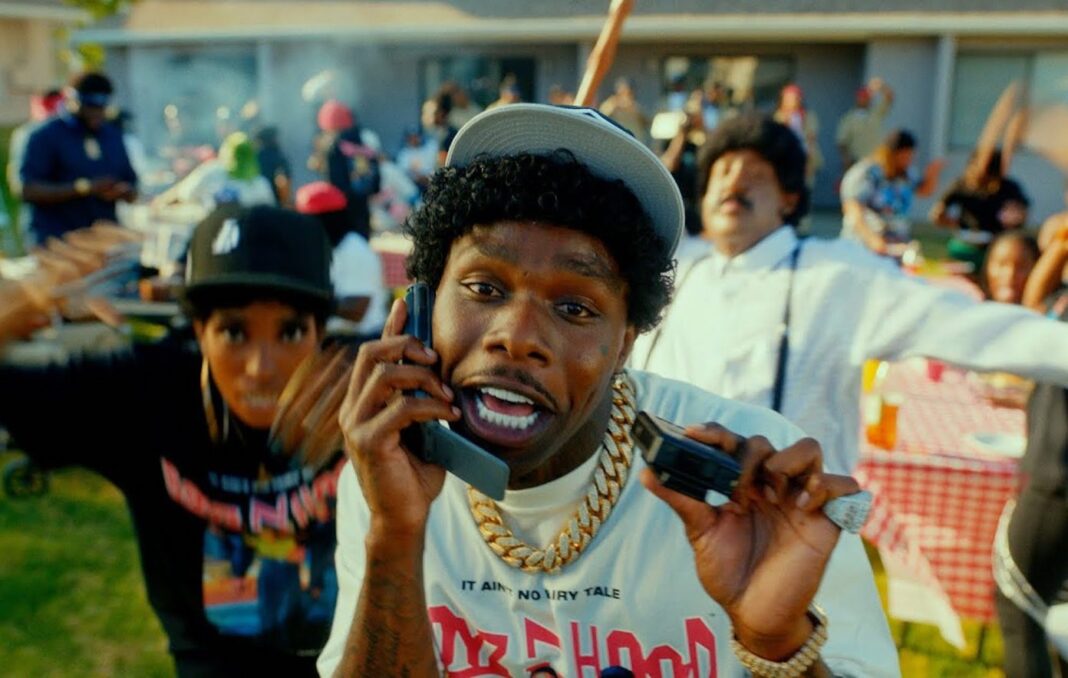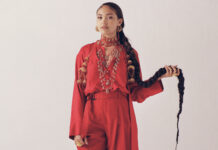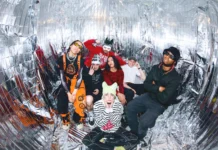It’s been a rough couple of weeks for DaBaby fans, and indeed anybody who prefers to attend rap concerts without a side dose of ill-informed bigotry. You’ll likely have seen it for yourself by now, but the situation can be summarised as thus; during his performance at Miami’s Rolling Loud Festival, the rapper shouted out fans who had attended without “HIV/AIDS – one of them deadly sexually transmitted diseases”, and made disparaging references to homosexual activity in parking lots.
He also bought out Tory Lanez (more on that later) and followed the whole thing up with a string of tweets about how people who don’t understand ‘the culture’ have no business criticising what goes on at his shows. As the criticism amplified, the festival cancellations began; Lollapalooza, Austin City Limits, iHeartRadio, Parklife. As with most trending topics of this nature, his de-platforming has already become a meme; this summer, DaBaby will not be performing at your local prom, dining establishment or seemingly, anywhere.
Though homophobia is still sadly prevalent in many aspects of popular culture, the rap space perhaps has more history of it than most. There have been decades of lyrics that normalise the use of the F-word, that trade ‘gay’ or ‘AIDS’ as synonyms for something being uncool or gross. Whether a purposeful barb or a crowd-following use of slang, such lexicon trickles down to fans, picking up intolerance and misinformation along the way. You can easily see how a millennial rapper like DaBaby might have picked up such awful rhetoric, but also why LGBTQIA+ fans and allies might feel torn about loving a style of music that never seems to love them back.
“I was pretty perplexed, to be honest; his comments just seemed to be out of absolutely nowhere, with no context,” says Cameron, a fan of US rap and a member of the LGBTQIA+ community. “I thought he was joking at first, then the posts afterwards just added further embarrassment. Not only was he wrong on several accounts, but what he said was harmful to everyone, not just the LGBTQ+ community. I wouldn’t say that I got comfort from everyone on IG/Twitter coming for him, but was the reaction needed? Absolutely.”
For Cameron, the resulting online discourse hasn’t necessarily helped matters. “The memes may be ‘funny’ and informative to us, but going forward, with artists like Da Baby, I feel they need further educating on the facts vs the misinformation that they’re spreading. In most situations, there’s always room for improvement and bettering yourself on a subject, not just putting out a regular Instagram ‘sorry’ post and continuing past behaviours. I hope he’s learned his lesson from this; cancellation can’t be a good feeling.”
Cameron’s point about education touches on an interesting context to our current climate of whistle-blowing. DaBaby’s comments were clearly unacceptable, misinformed and entirely irrelevant to the situation or his supposed point. They needed to and fully deserved to be called out; they are rooted in the stigmatisation of HIV and AIDS as some sort of choice uncleanliness, a stigma that many organisations and individuals throughout history have worked so hard to correct. And yet it is still entirely possible that he, in his ignorance, actually thought he was being funny in some way, or else paying a compliment to his own gay fanbase as being some kind of class above. Does this make things any better? Worse? Does it make any difference at all? Clearly the subsequent double-down and self-centring apology doesn’t help matters, nor does the outcry of fellow rappers such as TI who claim that DaBaby is being bullied for being ‘honest’. Something clearly needs to change, but is there anything about the current climate of rap for LGBTQIA+ fans to feel hopeful about?
“There’s certainly been some change, but I think this is still outweighed by a majority resistance,” says Hayden, a pop-culture writer and music fan. “If we consider some of Tyler, the Creator’s recent work we can see greater visibility of same-sex attraction in rap music. But then we see other rap artists like Eminem responding to him with homophobic slurs in diss tracks. As if that wasn’t enough, many have questioned whether Tyler is actually LGBTQ+ or simply queer-baiting for the sake of being provocative. Whichever way you look at it, queerness always seems to be the joke, the sucker punch in a diss track or a costume. There’s a complete lack of understanding and respect. Then we have people like Lil Nas X, who are fiercely pushing queer perspectives in rap and in pop culture, but who receive outrageous backlash from all sides.”
“We absolutely need more representation, but I don’t think it’s as simple as ‘we need more gay rappers’. The difficulty is that the presence of gay rappers inherently pushes that ‘otherness’, and widens the gap between progressive rap and the old guard. If a queer rapper has an incredible pen and superb showmanship, both of those things will be secondary to their queerness. And while homophobia exists in the culture as a whole, that won’t change. So I think there needs to be an industry-wide validation of queer perspectives, which is a cultural conversation rather than a specifically music-oriented one. Prolific figures in the culture must use their platforms to speak up for queer artists and speak out against ignorance – I’m talking radio, on social media, or on the mic at a show. If DaBaby’s comments showed anything, it’s that hate and misinformation is socially taught. Therefore, there’s so much un-learning that needs to happen in tandem before we can say ‘hey, here’s this cool queer artist’.
In the bid to encourage useful unlearning that goes further than simply cancelling one artist, it is interesting to consider what it is about the current climate that has allowed DaBaby’s downfall to be quite so swift. At the risk of whataboutism, he is hardly the first rapper to cast aspersions on the gay community, but he is amongst the first to have had it shut down quite so many opportunities in such quick succession.
The elevated awareness around both Coronavirus-misinformation and Pride Month likely plays a part, as does the ability to directly monitor the optics of your fanbase. Festivals are businesses after all, and Twitter provides a public perception litmus test that is stronger than ever before, allowing organisers to make swift assessments of who or what might be harmful to their brand. With important sociopolitical movements such as Black Lives Matter and #MeToo existing so visibly online, conversations around sexuality and gender tolerance are also coming to the fore, helping to challenge intolerance or lack of education.
The increasing vocal presence of huge key LGBTQIA+ figures such as Demi Lovato, Lil Nas X and Miley Cyrus also helps, although as with Black Lives Matter, we do need to be careful of passing the emotional labour of education onto those who are most harmed by the problematic behaviour itself. In this situation, the buck must end with DaBaby himself. Great swathes of reporting may have focused on ‘Levitating’ collaborator Dua Lipa’s response, or on Lil Nas X, who shrewdly redirected a ‘statement’ to his new single, Industry Baby, while Miley Cyrus has reached out to DaBaby in his DM’s with an offer of education. It’s a generous offer, but it’s a conversation she shouldn’t have to have — according to reports, DaBaby’s label Interscope are said to have been “extremely upset” by his remarks, and will hopefully take up the responsibility of speaking with him about his conduct going forth.
For many black female fans, LGBTQIA+ and otherwise, DaBaby’s ongoing affiliation with Tory Lanez (currently under a restraining order following his alleged shooting of Megan Thee Stallion) should have been enough to shut him down already, not to mention a 2020 altercation where he hit a female fan in the face. When it comes to public outcry, are the concerns of black women still lowest on the list? Either way, DaBaby’s behaviours have been problematic for some time, and whether you believe in ‘cancel culture’ or not, harmful words and actions do eventually have consequences.
In calling out his words at Rolling Loud, we show homophobic rap fans that they would also do well to re-evaluate any problematic prejudices, or else otherwise mind their own business. But as DaBaby’s streaming numbers inevitably go up in the wake of his increased column inches, it’s also a good moment to step back and think about how we can support those who are demonstrating helpful representation, whether that be through an embodiment of their own sexuality or simply through open, inclusive allyship.
“I definitely think Kevin Abstract is the future of rap as far as LGBTQ+ representation,” says Hayden. There’s a liberating amount of specificity in his lyrics that really feels like he’s prodding at the tired, outdated, heteronormative rap world. He lets his pen do the talking, and doesn’t do all that many interviews, so I feel like his queerness doesn’t often get sensationalised or reduced to a headline. I’m continuously grateful also to straight rappers like Vince Staples, who represent so much of rap’s hard edge but have collaborated with some wonderful queer artists like the late SOPHIE, or the singer KUCKA. This is a straight rapper talking very seriously about police brutality and gang violence, against some beats produced by a trans person with a feature by a queer woman. You don’t get an explicit sense of any of these people’s gender expression or sexuality, and that’s exactly the point. It’s my utopian ideal of inclusivity in rap, and I hope we see more of it to come.”
In the hope of this more positive future, where does it leave DaBaby? A summer off touring serves the double purpose of zero-tolerance messaging and personal recalibration, but ultimately, Hayden believes that true lasting change needs to come from a place of listening — on both sides.
“I don’t believe in cancel culture at all. When we sever those ties, we lose the opportunity to educate, listen and move forward together. I would’ve loved to see DaBaby take this moment to revise his statement, give accurate and correct information to his fans about HIV, and try and undo some of that stigma. Regardless, I think cancelling anyone, permanent or otherwise, only emboldens those who share those same beliefs. It drives the wedge further, and it’s counterproductive. Instead, we need to ask ourselves: why does DaBaby think this? Who taught him this? Why do so many of his fans agree with him? If we can answer those questions and work to address them, then that’s how we get closer to progress.”







